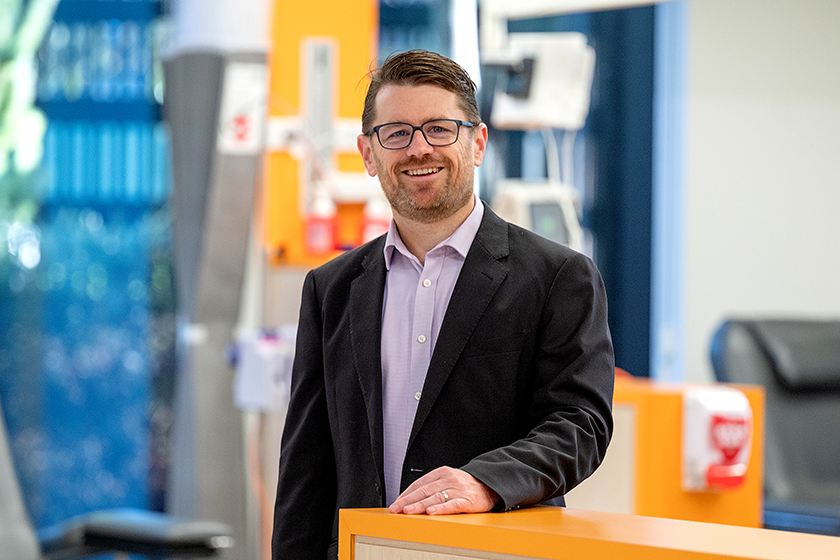
Bendigo Health is helping lead the world in in a breakthrough treatment of a common and potentially deadly type of non-melanoma skin cancer.
A recent drug trial at Bendigo Cancer Centre involved patients with cutaneous squamous cell carcinoma that often occurs in sun-affected areas of the head and neck but can occur anywhere and which is the leading cause of non-melanoma skin cancer deaths.
Oncologist Dr Sam Harris said the trial involved six local patients with a high risk of their cancer returning after surgery and radiotherapy.
“The C-Post trial was aimed at patients with what we call high risk Stage 3 disease who’ve had a squamous cell skin cancer that has travelled to the lymph nodes.
“The idea of this trail was to give them the trial immunotherapy drug, cemiplimab, after their surgery and radiotherapy to try to reduce the risk of the cancer reoccurring.
“Cemiplimab stimulates the immune system to eradicate any microscopic bits of cancer that might be left behind after surgery,” Sam said.
The overall results revealed there was a marked reduction in the risk of the cancer returning with approximately 35 per cent in the placebo group and only 13% in patients who received the trial drug.
For Dr Harris, it’s vital that these trials are conducted in regional centres like Bendigo.
“We were very happy to be involved in the trial here in Bendigo because it gives access to our patients to treatments they wouldn’t have had otherwise,” said Sam.
Bendigo Health Research Nurse, Felicity Osmond who has nursed in oncology for more than 40 years, is immensely proud of the work of the Bendigo Cancer Centre research team.
“It’s important because we have a huge population in Bendigo and Loddon Mallee who are exposed to the sun due to their work whether it be outdoor workers, farming or agriculture,” said Felicity.
Like Gary Jones who’s in his seventies and took part in the clinical trial close to his home in Bendigo. While Gary had a sedentary indoor career he remembers being exposed to the sun in his childhood and youth.
“As a young bloke you worked on the farm you did things like that and the more you look back that’s probably what started the skin cancer.
“You’re doing footy training and you have the shirts on shirts off competition and you’re in the pool or down the beach every chance you get and you just don’t think,” Gary said reminiscing about his youth.
A pimple on top of Gary’s head was found to be an aggressive squamous cell carcinoma. It began to spread leading to surgery involving skin grafts removal of nearby lump nodes.
“I've always had a lot of skin cancers on my hands, arms, body, like everyone. I'm in the age group where you got sunburnt very badly before you're tanned that was part of the rules. You didn’t wear hats, you didn’t wear shirts out in the sun, you put on oil and cooked.”
“I said to my wife, if I get the drug and it works and it helps someone else not have to go through what I went through, we’ve got a winner.
“Fortunately, I haven’t had a relapse of any sort so we’ve got a situation where we won both ways. We’re getting very good quality care to make sure we get to the end of the trial.
“Someone else is going to be a winner because the drug is going to help them,” said Gary.
“I found it was fabulous to be able to do the trial here in Bendigo it was so much easier than having to travel. Not only have we got the nursing staff like Felicity it was convenient and very comforting as a patient,” Gary said.
Australia has the world’s highest skin cancer rates, and two out of three Australians will be diagnosed with some form of skin cancer in their lifetime. Australian deaths from and other non-melanoma skin cancers have almost doubled in recent years.
Dr Harris emphasised the gravity of the Bendigo trial result on the rest of the world.
“The fact that it was published in the New England Journal of Medicine shows the quality of the results, that's a prestigious, one of the most prestigious medical journals in the world.
“Only top-level research gets published there and usually only research that's meaningful and practice changing gets published.
“Locally, these results are very exciting. You know, Australia has a very high rate of sun damaged skin cancer and we see a lot of these patients and it’s great to have an extra option to treat them.
Dr Harris is confident the success of the trail will mean the drug will eventually be available on the Pharmaceutical Benefits Scheme.
“I have no doubt that the drug company will put an application into firstly the TGA and then the Pharmaceutical Benefits Advisory Committee to get PBS listing for this drug so it becomes the new standard of care in years to come.
“It’s very rewarding, I want what’s best for my patients and it’s great to be able to offer them ground-breaking treatment her in Bendigo without them having to travel to Melbourne.
Dr Harris said the trial would not have been possible without collaborating with Peter Mac whose radiation oncology team were instrumental in identifying patients for the trial.
For Gary, his focus is on spreading the word of prevention, “I love it now when you go past the primary school and you see all the kids with their hats on. Those kids have got a good future because it's a pretty insidious thing cancer when it sneaks up and grabs you.”
Find out more about Bendigo Cancer Centre https://www.bendigohealth.org.au/bendigocancercentre/